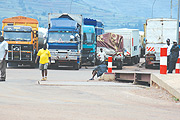By December 31, this year, the Rwanda border at Gatuna and the Ugandan post at Katuna will be operating 24 hours, seven days a week. However the process will begin by both border posts operating up to 10 p.m. by Sept. 1. The borders are currently open until 6 p.m.


By December 31, this year, the Rwanda border at Gatuna and the Ugandan post at Katuna will be operating 24 hours, seven days a week. However the process will begin by both border posts operating up to 10 p.m. by Sept. 1. The borders are currently open until 6 p.m.
This decision came after a two day transport data validation meeting July 14-15, held in Kampala by the Seamless Transport Committee, when Uganda and Rwanda revenue agencies agreed to extend customs clearance services at the Katuna/Gatuna border.
"We have to open these borders to reduce delays that induce high transport costs which are eventually passed onto the consumers of these goods.
If we want our economies to grow faster we have to change the way we do things,” Alex Kabuga, Seamless Transport Services chairman, told journalists during a press briefing in Kampala on July 16.
He said the committee was committed to reducing transit time spent on tariff and non-tariff barriers between Mombasa and Kigali to a maximum of four days by the end of 2008.
Recently in his speech at the East Africa Investment Conference, President Paul Kagame decried the poor conditions of both the Northern and Central corridor highways including the time it takes to cross borders which in some cases may take more than 24 hours.
"The issue of transport is very sensitive as a landlocked country. We continue to experience high costs on transport and some of these costs are related to non-tariff barriers.
Besides we have been losing a lot of money because of border delays. Reducing non-tariff barriers will reduce costs,” said Mr. Jean Kanyamuhanda, the transport sector coordinator representing Rwanda on the Committee.
The meeting also reviewed and validated transport data collected from July 4-12 this year, along the Northern Corridor from Mombasa to Kigali.
The Seamless Transport Committee is made up of government and private sector stakeholder representatives from Kenya, Uganda and Rwanda.
Ends


